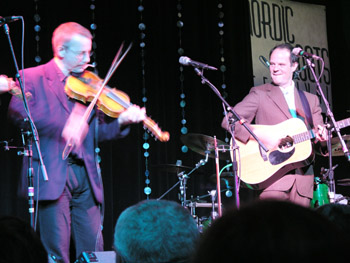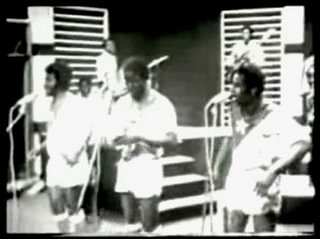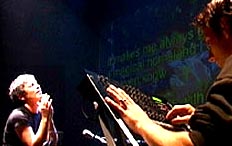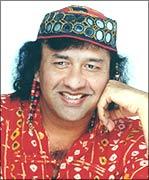I do not normally present 'press promos' as part of this blog, but my long time compadre-in-music Ken Braun of Stern's Music in NY sent out this promo sheet with his current releases, and I just had to share it with you all...
Cliff Furnald, ed.
-----------------------------
Dear friends and colleagues,
The first people that ever lived in North America walked across the iced-over Bering Strait from Siberia to Alaska about 10,000 years ago. They carried no documents and were not authorized to enter this country. Border bears spotted them and gave chase, and such encounters resulted in casualties on both sides. Law enforcement was obviously inadequate. Some of the "frozenbacks" were deported to their country of origin, but many (no one knows exactly how many) slipped into America. It’s been happening like that ever since, and not only on the northern border but also along every other frontier. See what happens without strict immigration controls? The country fills up entirely with people from somewhere else.
At least it’s been good for music. Without immigrants, American music would be little more than birdcalls, frog choruses, coyote howls and the wind in the trees. Thanks to all of the people who have come to this country from somewhere else, starting with Asians, followed by Europeans, Africans, Central and South Americans (whose ancestors had themselves originated elsewhere) and of course islanders from near and far, American music is the most diverse, dynamic and popular in the world. This phenomenon isn’t just historical, something that happened long ago; it’s ongoing and as vital now as it ever was. Consider how the Celtic music revival of the past few decades has inspired the bluegrass revival in this country, or the ways Indian and Indonesian forms have influenced some of America’s best modern "classical" composers. Think of the immense influence of Jamaican dub and dancehall on hip-hop, or the various Latin styles that color everything from the most serious jazz to the most ephemeral pop these days as much as in the past hundred years.
And African music? Elements of African music so thoroughly imbue so many kinds of American music that we can hardly imagine what our nation would sound like without them. True, this process began centuries ago, but it didn’t end with the abolition of the Atlantic slave trade. Africans are still coming to America – this time of their own accord if not always by the book (ironic in light of the fact that it was once legal to transport their ancestors here against their will) – and they’re bringing new music with them. From African dance classes and drum circles to African club nights in cities across the country, and on to the millions of records sold by African-born stars such as Dave Matthews and John Legend, Africans continue to make themselves heard in America. The African components of American music are being replenished, building on what came before but introducing new things too, further enriching the national culture.
We at Stern’s Music favor liberal immigration policies. We believe hospitality makes us all better people. We’re thankful for our foreign-born colleagues and proud to promote the music of immigrants. We’re especially pleased this month to release three CDs by African artists now living and working in the United States. Martino Atangana, from Cameroon, teaches at the City University of New York Graduate Center, having gotten his Ph.D. at the Sorbonne, but he has also played guitar with Manu Dibango, Paul Simon, Jean-Luc Ponty, Henri Dikongue, Hassan Hakmoun and Shannon Jackson. Keeping one foot on the lecture forum and the other on the stage, he’s been gigging in and around New York for seven or eight years and has won a following that’s as multi-ethnic as his band, African Blue Note. Martino is a particularly nimble bikutsi guitarist but, as his new album demonstrates, he and his band are adept at Caribbean music and contemporary jazz as well as various African styles. One member of African Blue Note, pianist Azouhouni Adou, has recorded a CD of his own. In addition to the keyboards, Azouhouni plays clarinet, sings, and leads his own band, all with impressive skill and verve. He and his sidemen play in a variety of styles too, with a particular flair for funky jazz.
Guelel Kumba also came through New York, but this Senegalese-born Fulani singer and guitarist has wound up, seemingly by gravitational pull, in the same part of northern Mississippi that has given birth to so many great bluesmen. There he and a bunch of local musicians have formed a band they call
Afrissippi. Like the late Ali Farka Touré jamming with Taj Mahal, Gatemouth Brown or Ry Cooder, Afrissippi instinctively finds the crossroads where West African traditions and the blues meet. This is truly African-American music. In fact all three of the artists we’re focusing on this month are making music that is both African and American. Pass out the green cards.
We’re not saying everyone should settle in America. On the contrary, we think that instead of either trying to keep immigrants out the U.S. or throwing open the gates to unregulated cheap labor, our government and businesses would do far more good by supporting international policies and programs that strengthen other countries’ cultures, economies and democracies. Help to give people good reasons to stay home, opportunities to lead fulfilling lives wherever they are. At its best (though perhaps its most paradoxical), globalism encourages nationhood and independence as much as freedom of movement and enterprise. It comes down to all people’s right – and the actual possibility – of self-determination. Which is why we’re so enthusiastic about
Midnight in Mali. (You knew there had to be a musical angle.) This latest Stern’s Africa CD was recorded at an extraordinary concert in Bamako featuring a once-in-a-lifetime array of some of Mali’s greatest artists, including guitarist Djelimady Tounkara, balafon virtuoso Keletigui Diabaté, n’goni whiz Basekou Kouyaté and singer Dieneba Seck, all under the direction of Habib Koité. As Banning Eyre’s introduction observes, "It was that rare occasion when musical giants dare to risk the new, rely on their wits, and freely explore their shared heritage: the majestic, matchless variety of Malian music." Such a concert could not have happened in New York, only in Bamako. So while we advocate mixing and exchanging, we also celebrate tradition and uniqueness, and we see no contradiction in that. Our slogan is "Support local music everywhere!"
Stay well,
Ken Braun
Stern’s Music
-------------------------------------------------
You will find (or will find soon) many of the CDs mentioned by Ken at
cdRoots
 Like his earlier recording Lokshen, Enrico Fink has created a record that is a true treasure trove of information about the Jewish experience in Italy. On Il Ritorno alla Fede del Cantante di Jazz (The Jazz Singer's Return to Faith), the premise is to take the Jewish liturgical tradition in Italy (and in particular in Ferrara and Firenze) and distill it through Fink's experiences. The result is a fascinating work that can be highly traditional ("El male rachamim") or highly modern ("Lo Amut"). It inhabits the same spiritual ground as Robbie Robertson's soundtrack for "The Native Americans" (especially on "Eliyahu" with its dialog between the child singer and Fink), another work of passion for a culture endangered, as well as things like Hector Zazou's Songs from the Cold Seas, Tom Waits, U2 circa The Joshua Tree, cantor music and jazz, all of which come in and out of focus throughout this record creating a polymorphic work that is both contemporary and timeless, the effort behind it evident but not crushing.
Like his earlier recording Lokshen, Enrico Fink has created a record that is a true treasure trove of information about the Jewish experience in Italy. On Il Ritorno alla Fede del Cantante di Jazz (The Jazz Singer's Return to Faith), the premise is to take the Jewish liturgical tradition in Italy (and in particular in Ferrara and Firenze) and distill it through Fink's experiences. The result is a fascinating work that can be highly traditional ("El male rachamim") or highly modern ("Lo Amut"). It inhabits the same spiritual ground as Robbie Robertson's soundtrack for "The Native Americans" (especially on "Eliyahu" with its dialog between the child singer and Fink), another work of passion for a culture endangered, as well as things like Hector Zazou's Songs from the Cold Seas, Tom Waits, U2 circa The Joshua Tree, cantor music and jazz, all of which come in and out of focus throughout this record creating a polymorphic work that is both contemporary and timeless, the effort behind it evident but not crushing.















